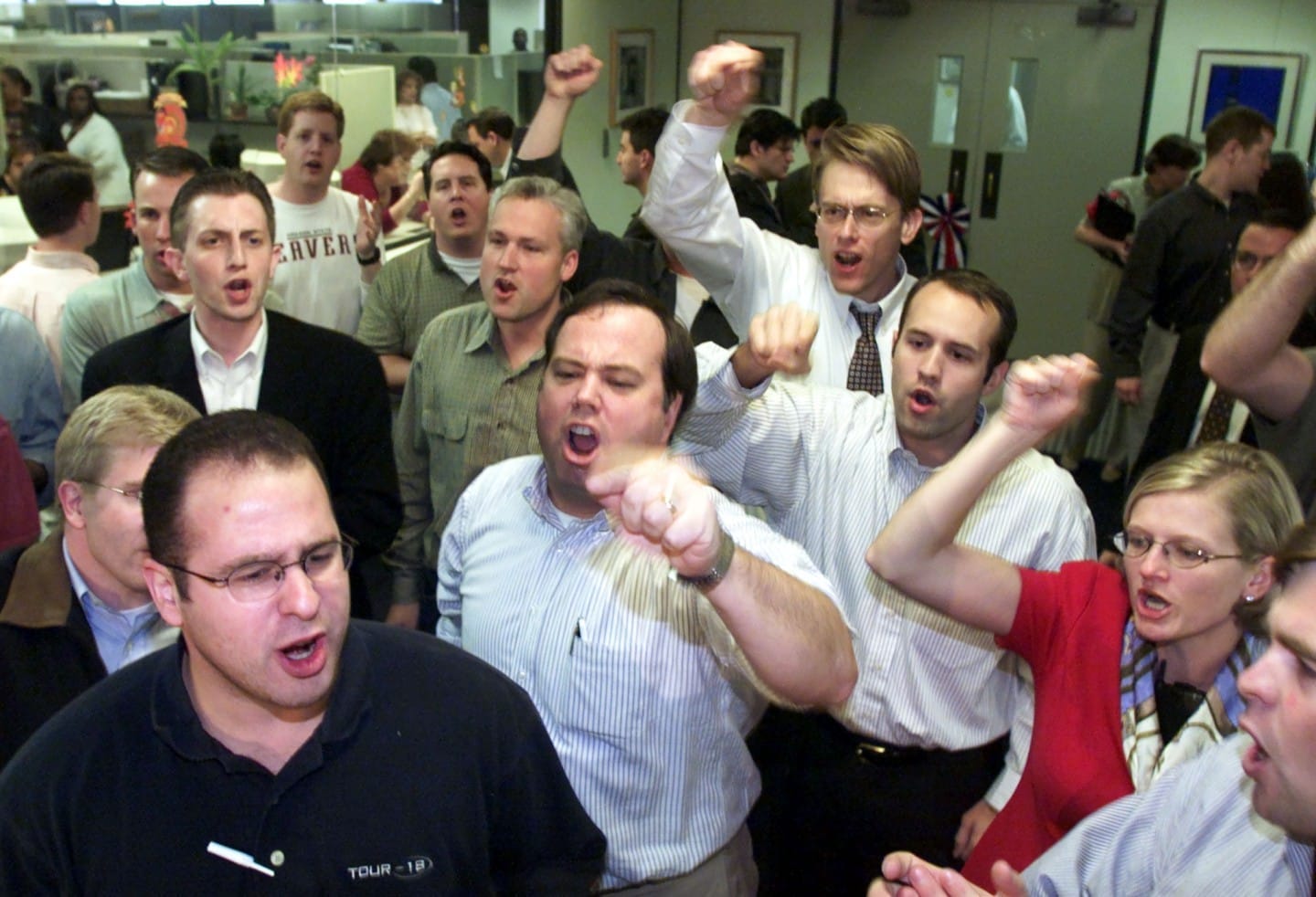
It's fun to mock the fevers of Trump's critics, especially Adam Gopnik! They can't be helping their cause. right? Judging from the past month's impeachment polls, they're not. But I don't laugh as much as I used to — because I've become convinced that the joke may wind up being on Trump after all.
The problem isn't anything specific Trump's done. It's a simple social fact: If Trump wins in 2020, the country will be ripped apart. If Trump loses, that's unlikely to happen.
It's been hard enough for Trump's opponents to weather the 40 months since their 2016 humiliation -- which, for Democrats, crushed the presumption that demographics (the "coalition of the ascendant," Ron Brownstein subtly called it) would lead to permanent political dominance. The arc of history compels it! 2016 was equally infuriating for the Never Trump Republicans, reduced to waiting for what would surely be a tax-cutting/interventionist/loose borders K-St. Restoration (in which they could prosper whether they won the presidency or not).
Serial hopes for Trump's premature departure have now been serially dashed, but surely the 2020 election will restore the rightful order, yes? Yes?
If it doesn't, the frustration for the Resistance will be near unbearable. Does anyone think the Left will react to a Trump win — and the prospect of another four endless years (more endless now that attention spans have shrunk)— by saying, "Well, guess we have to organize harder"? Or that, as Adam Serwer implausibly predicts, "the devastation of the defeat will lead the Democrats to court conservative white people." (Come back, Democratic Leadership Council! All is forgiven.)
It seems way more likely that many will simply abandon altogether a reliance on our current democratic apparatus. It includes the Electoral College, after all, and a malapportioned Senate, and the filibuster — institutions that arguably represent the dead hand of the past. The Resistance represents the future! And the future doesn't have a vote in our system. Neither does the planet. Democracy isn't everything. Provocative Vox article tk.
I'm not saying Resisters will resort to violence -- though almost certainly some will,.(Think antifa X 50.) But a large group may well launch the sort of disruptive protests that would make the 60s look like an Aspen Ideas Festival. (Think Yellow Vests X 10.) You can take to the bank a secession movement in one-party California. It will fail -- but will also further strain ties to the mainland across the Mojave. Whatever lingering public respect blue states paid to voters in the South and Midwest will be tossed aside, replaced by references to "hicks," "yahoos," and worse. Blue-state businesses whose owners favor Trump will be routinely, and effectively, boycotted, if not trashed.** The enlightened vanguard of history doesn't live by old rules.
If Trump loses, would the frustration level among his supporters be anywhere near as high? They've had four years. They'll be demoralized, go into opposition. The defeat can be blamed on Trump's flaws, the anger worked out through internecine Republican battles. Yes, there will always be extreme outlier groups, and crazed individuals — we've already had them. For the vast majority of Trumpers ... well, maybe I lack sufficient imagination, but it's hard to see any sort of general social convulsion greater than, say, the Tea Party during Obama's term.
This asymmetry, in terms of prospective reaction, may be unjustifiable — and infuriating in itself. But even if you are a hard core Trump voter, you have to think about it, if you're a patriot. Do you want your country ripped apart? It's hard to sustain a democracy if the basic bonds of loyalty disappear. The crazier the anti-Trumpers get (and they can always get crazier) the more you have to worry, and the more you have to reluctantly think about whether a vote for Trump is really worth it. That's the weird thing: Sometimes angry, crazed behavior causes a backlash -- but even angrier and crazier behavior inspires fear and a desire to avoid aggravating the conflict at all costs. It's hard to believe voters won't take this fear into account, at least subliminally.
Historical example #1:The antiwar protests of the 1960s In college, I was one of those Vietnam War protesters who publicly opposed throwing rocks at shop windows and other forms of violence against property, but who secretly thrilled at the tinkle of breaking glass. I felt guilty about this until my roommate noted that one reason the war ended was that Americans — even Americans who otherwise supported the war--decided it was just causing too much chaos, ripping the country apart, destroying the next generation.

Historical example #2: The Florida Recount In December, 2000, it was the right that was angrier than the left. They'd been out of power for 2 terms. They'd impeached the president but failed to remove him. (Familiar?) The networks had already declared George W. Bush the winner. If Al Gore won on a recount, they were going to be incandescently furious, a prospect brought home when GOP cadres in button down shirts and sports coats nearly rioted at the Miami office where votes were being counted. You don't think an awareness that a recount might lead to all hell breaking loose informed the Supreme Court's otherwise unjustifiable opinion cutting the recount short? (What if, for example, the GOP-led Florida legislature refused to accept a pro-Gore result?)
Again, it's not illegitimate to worry about these things. In 2020, even if you hate what Democrats might do in office -- racial preferences, loose borders, “socialized medicine” -- you might prefer that to a national car crash.
Worse, if the parties realize that this dynamic is at work, there seem to be no corrective mechanisms that will kick in. It will be in Democrats interest to do nothing to discourage fear of social rupture. The crazier they talk and act the better, from this point of view. Nor are Republicans under Trump well-positioned to allay fears. If Trump suddenly became civil, that might just drive Democrats madder. (Now they're expected to like him? Who is he kidding.) If Trump moved left on an important issue like health care -- if he signed a pact with Neera Tanden providing a glidepath to Medicare for All -- would it placate the Resistance? Of course not. (Now they're supposed to hail Cheeto as a great reformer? You know who else had a national health system?) ***
It’s difficult to think of anything Trump could do to calm them down, even if it were in his nature to do that (he prefers trolling them) or part of his campaign strategy (which avoids anything that might turn off his base). Maybe you have some ideas. Note that the goal is not the same as "winning over moderates." That's easy! What Trump would need to do is convince moderates that he's winning over the Left, at least enough to ensure social peace. Unless moderates are fools, hard to see that happening. ****
_____
** — I realize I'm going off on my own Gopnik-like disaster fantasy. I’ll try to keep it in check. Some businesses are already being boycotted.
*** -- Yes, the Resistance would be less angry if Democrats win the House and Senate. Also if Justices Kavanaugh and Gorsuch somehow lurch permanently to the left. But a voter casting his or her ballot on November 3d can't be confident of any of these things happening. And they wouldn't remove the prospect of four even more intense years of interbranch trench warfare — like announcing in November, 1918 that World War I would be extended until 1922.
**** — Even if Trump bounced Mike Pence as his running mate and replaced him with relatively conservative Arizona Democrat Sen. Kyrsten Sinema …. [Actually that’s not a bad idea-ed.]
__________
Ethnic Corporatism Watch: Did you know that the Department of Education targets special government aid to "Hispanic Serving Institutions," defined as institutions "with at least 25% total full-time enrollment of Hispanic undergraduate students." I need to brush up on my Equal Protection law, but this does not seem wildly constitutional to me. Not only does it single out some ethnicities for extra benefits, but it creates a financial incentive for schools that are within range of the 25% line to admit Hispanics over more qualified whites -- or blacks, for that matter. What other minority ethnicities can get their own federal slush fund? Persians? Arabs, Jews etc.?
The program seems way more suspect than the parallel aid program for Historically Black Colleges and Universities, which directs funding to schools "established prior to 1964, for the primary purpose of educating African-Americans" regardless of what percentage of students are African American today (and some have become majority white). Because the list of HBCUs is fixed, there’s no incentive to meet a racial quota in admissions-it won't put a school on the list.
Maybe I'm missing something. [Thanks to Steve Bartin of NewsAlert]
__________
Note to Henry Olsen, Oren Cass, and the other esteemed commentators defending Sen. Marco Rubio’s latest intellectual positioning: It’s a worthy debate. But Marco still don’t vet.


